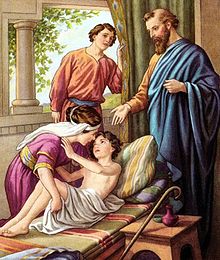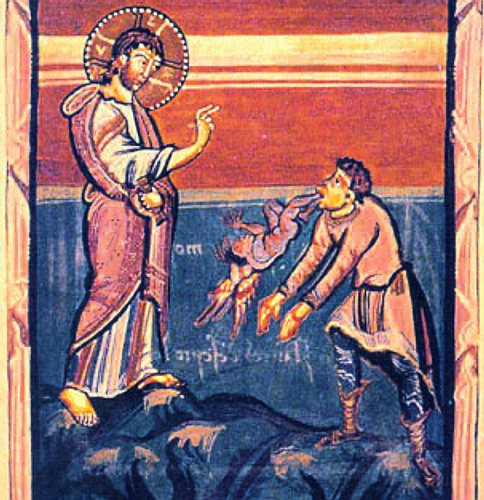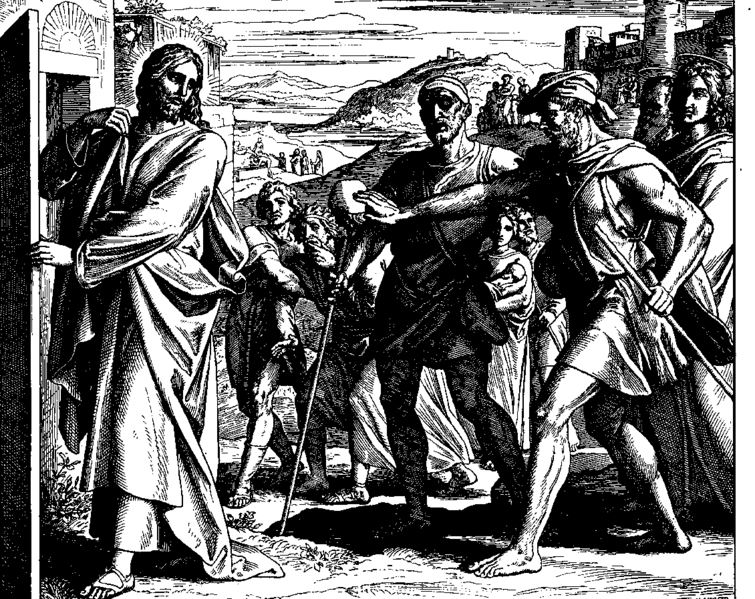Matthew 9:35-38 – Looking at Jesus our shepherd
Matthew 9:36 (translation by )
Seeing the crowds, he had compassion for them, because they were harassed and thrown down like sheep with no shepherd.
Can you imagine how a flock sheep would behave when there is no leader around them or no shepherd?
The people listening to Jesus knew about harvesting. But we can wonder if the fishermen would have understood Jesus talking about a master of the harvest and a harvest truly being plenteous, but only having a few labourers. We can look forward to a rich harvest but still have to see that the workers are few.
People should come to see that the son of man, who is also the son of David and the son of God at the same time, as the sent one from God is next to the King also the Good Shepherd who wants all his sheep to be saved. Just as a shepherd looks after his flock when he finds himself among his scattered sheep, so Jesus also will look after his sheep, the people who God has given him. Though at his time like in our time they need rescue from all the places where they were or are scattered when it was or is cloudy and dark. (Ezechiel 34:11–12, 15–17) Like the Adonai Elohim will seek the lost, bring back the outcasts, bandage the broken, and strengthen the sick, He has given the world His only begotten beloved son to heal them and to gather them.
In this ninth chapter of the Gospel of Matthew we could see how Jesus takes care of those who are willing to belief in him and for those who put their hope in him. He is there for the needy and helpless people. Throughout the gospels we can see that Jesus was patient to listen to people and to answer their questions. He spoke to crowds, fed them, healed the sick and reached out to outcasts, even not to be afraid to mingle with them or to eat with them. Therefore he got criticized (Matthew 9 & 15)
In this world people could see many kings. But none of them managed to be as good as the king God would provide from the seed of king David.
Among the scattered sheep in exile, Ezekiel explained that God had to remove the bad kings; yet he also promised that God would raise up a son of David to rule over them again:
Ezekiel 34:10, 23 (NIV)
10 This is what the Sovereign Lord says: I am against the shepherds and will hold them accountable for my flock. I will remove them from tending the flock so that the shepherds can no longer feed themselves. …
23 I will place over them one shepherd, my servant David, and he will tend them; he will tend them and be their shepherd. {Jesus our shepherd (Matthew 9:35-38)}
Jesus looked at the people around him and could feel their agony.
writes
sheep harassed (skullō) and thrown down (rhiptō) under empire after empire (9:36).
But just as God had said, the promised king now stood among them in the person of Jesus. He was the ruler anointed to restore David’s kingship, the shepherd of Israel. Matthew has already used that language to describe Jesus as their king:
Matthew 2:6 (NIV)
But you, Bethlehem, in the land of Judah, are by no means least among the rulers of Judah; for out of you will come a ruler who will shepherd my people Israel.When Matthew speaks of Jesus’ authority, this is what he means. He is Israel’s shepherd. That’s what Jesus was doing:
- announcing the good news of the kingdom;
- being the shepherd who restores his people (9:35).
That’s what he’s been doing since the start (compare 4:23).
The unshepherded sheep of Israel were scattered all over the ancient world in Jesus’ time. Drawing them back into the care of the Davidic shepherd would be a massive task.
For Jesus, it felt like standing in a field with a massive crop around him, and only a few workers to help bring them in (9:37). That’s why he asked his disciples to go and petition the Lord of the harvest to send out workers right across the harvest field, to every corner where the sheep were scattered (9:38).
The king will not complete this harvest alone. He appoints workers for his government, delegating his regal authority to those who ask him for help to harvest, to bring the earth back under his kingship (10:1).
We are not individual sheep, searching for existence in postmodern isolation for fear of being harassed and mistreated. We belong to the shepherd. He’s everyone’s shepherd. And the shepherd is drawing the scattered sheep together into a kingdom where we belong, a community where we care for each other the way the shepherd cares for us.
What others are saying
G. K. Beale, The Temple and the Church’s Mission: A Biblical Theology of the Dwelling Place of God (Downers Grove, IL: InterVarsity Press, 2004), 174:
The miracles were a sign of the inbreaking new creation, where people would be completely healed.
Craig Blomberg, Matthew, New American Commentary (Nashville: B & H, 1992), 166:
The language of “sheep without a shepherd” echoes Num 27:17 and Ezek 34:5, in which the shepherd is most likely messianic (cf. Ezek 34:23). Similar sentiments will well up in Jesus again at the feeding of the five thousand (Mark 6:34). As in the days of the prophets, the rightful leadership of Israel had abdicated its responsibility, as demonstrated by its inability or unwillingness to recognize God’s true spokesmen. “Harassed and helpless” literally means torn and thrown down (cf. Berkeley, “mangled and thrown to the ground”). Predators, and possibly even unscrupulous shepherds (Zech 10:2–3; 11:16) have ravaged the sheep. Verse 36 provides a stinging rebuke to the Pharisees, scribes, and Sadducees.
Craig S. Keener, The Gospel of Matthew: A Socio-Rhetorical Commentary (Grand Rapids, MI: Eerdmans, 2009), 309:
The term Jesus uses for “workers” here recurs in 10:10 (cf. 20:1), indicating that the workers Jesus wished to send forth into the harvest were his own disciples. … After commissioning them to pray for “workers,” Jesus commissioned them as “workers” (10:10).
+
Preceding articles
More than just a man with authority of speaking
Nazarene Commentary Matthew 4:23-25 – Kingdom Preaching and Healing Draws Crowds
Matthew 9:27-31 – Blind Men Healed
Matthew 9:27-31 – What others are saying about the blind men recognising the son of David
Matthew 9:32-34 – The Nazarene’s Commentary: Speechless Demoniac Healed
Matthew 9:32-34 – How others look at the blind, speechless and demoniac being healed
Matthew 9:35-38 – The Nazarene’s Commentary: A Preaching Tour in a Great Harvest
Authority from the One God to one mediator between God and men
Hebraic Roots Bible Matthew Chapter 28
++
Additional reading
- Written down in God’s Name for righteousness
- Bible, helmet of health, salvation and sword of the spirit
- Counterfeit Gospels
- Many forgot how Christ should be our anchor and our focus
- A birthday passed nearly unnoticed
- Missional hermeneutics 4/5
- Atonement And Fellowship 2/8
- Looking for a shepherd for the sheep and goats
- Others that hinder the message
- Learn how to go out into the world and proclaim the Good News of the coming Kingdom
- Which Christians Actually Evangelize
- Jesus … will come in the same way as you saw him go
+++
Further related articles
- Jesus!
- Solemnity of Jesus Christ the king- (A): Jesus is King, Shepherd and Judge.
- Jesus-Shepherd for All Who Believe
- Names of Jesus – The Good Shepherd
- “Why Is Jesus the Good Shepherd?”
- Jesus: The Good Shepherd (ready writer)
- Jesus The Good Shepherd (by Grace Apocalypse)
- The Sheep of God’s Pasture
- The Good Shepherd
- Jesus – My Good Shepherd
- Jesus is for Kings and Shepherds
- The Compassionate Jesus
- Called by Jesus the shepherd of your soul
- How does Jesus meet our needs?
- Every Good Work
- What They Really Need
- All You Have to do is Follow Jesus!












 Bijbelvorsers Webs
Bijbelvorsers Webs Belgische Vrije Christadelphians / Belgian Free Christadelphians – Old Google Main Website
Belgische Vrije Christadelphians / Belgian Free Christadelphians – Old Google Main Website Christadelphian Ecclesia
Christadelphian Ecclesia Hoop tot Leven – Redding in Christus
Hoop tot Leven – Redding in Christus
Recent Comments